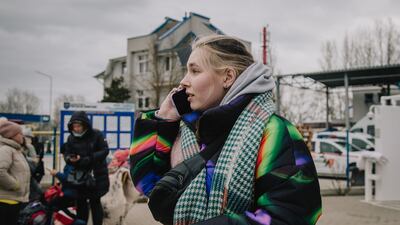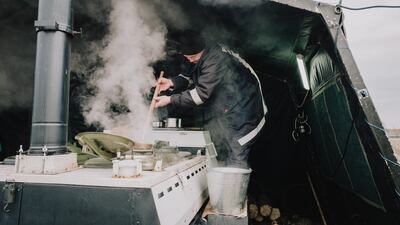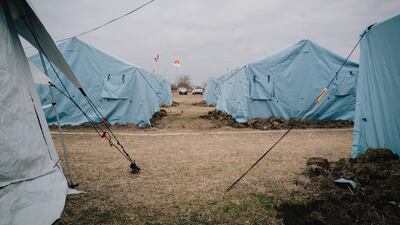As the Omicron wave of coronavirus began to recede across Europe in mid-February, Moldova’s largest Covid hospital was beginning to quieten. Oleg Crudo, the hospital's director, was looking forward to a few weeks' rest after two of the longest years of his career.
“We were winding down operations and planned to close the centre on March first,” he said of the 510-bed field hospital on the site of Chisinau’s MoldExpo centre, where 42,000 Moldovans infected with the disease were treated over the course of the pandemic.
“Then on February 24, we got a call from the government: 'You have to get the centre ready today to take in refugees'.”

In only six hours, Mr Crudo, a military physician who previously ran field hospitals in war zones including South Sudan, retrofitted the hospital to house up to 600 people in the bays formerly used as isolation and rehabilitation units for Covid patients.
By nightfall the centre was full; within 48 hours, 2,500 refugees, about 30 per cent of them children, were on site looking for food, shelter and information.
“If we hadn’t had the MoldExpo centre, the country — not just Chisinau — would have collapsed,” said Ion Ceban, mayor of the capital city.

Moldova, an impoverished post-Soviet nation of 4 million people on the extreme south-eastern edge of Europe, is the most exposed neighbouring nation in Russia’s war on Ukraine. It enjoys neither the financial support of EU membership nor the security of being part of the Nato alliance, and already has 1,500 Russian soldiers on its soil in the contested region of Transnistria.
Despite a lack of funds and worries of a Russian incursion into its own territory, Moldova has played an outsize role in mitigating the refugee crisis through a combination of nimble organisation and generous hospitality, taking in more refugees per capita than any other country.
A warm meal in a cold field
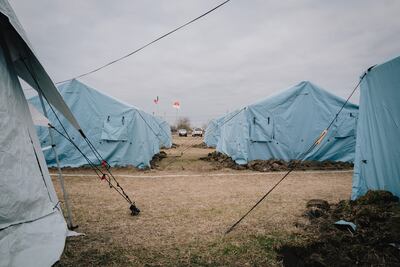
While Mr Crudo and the team at MoldExpo scrambled to convert Covid bays into preschool classrooms and family dwellings, Iurii Golban and members of the Interior Ministry’s migration service were digging latrines and pitching large blue tents in a field a kilometre from the Palanca border crossing, through which about 15,000-20,0000 people cross each day.
The camp, which can sleep up to 300 people a night, functions as a temporary stopover for those who arrive on foot without onward plans. Most stay only a few hours or a single night before heading towards the capital or being picked up by friends and family.
“Our guests are mostly mothers with young children,” Mr Golban, who runs the camp, said. “It’s a safe, warm place where people can stay while they figure out their next moves.”

Behind a mess tent where families warmed themselves over paper cups of tea, immigration officers, who until a week earlier worked desk jobs, were peeling carrots, chopping onions and tending to a massive wood burning field stove as they prepared the evening meal.
“It’s not our normal job, but we’re doing what we can,” said one officer tending to a cauldron of white beans. “You have to. You look at these families and think, these are our neighbours. It’s the human thing to do.”
Army of volunteers
While the Palanca border camp is run exclusively by Interior Ministry officers, most of the country’s 44 refugee centres and dozens of ad hoc help points are manned by an army of volunteers.

At the MoldExpo, about 560 volunteers work eight-hour shifts manning intake desks, teaching preschool classes, sorting donated food and clothing, co-ordinating Covid vaccinations and making meals for the nearly 18,000 refugees who have passed through.
Some are doctors who worked in the field hospital, others are high school pupils taking a break from their studies. A few are refugees themselves.
After being awoken by messages of shelling in nearby cities, Polina and Artyom fled Ukraine's port city of Odessa on the first day of the war to stay with Polina’s family in Moldova.
“The first morning we were in Chisinau, I was woken up by the rubbish collectors banging the cans and I thought, good lord, they’re bombing Chisinau, too,” said Polina, who grew up in Moldova but moved to Odessa, where her husband is from.
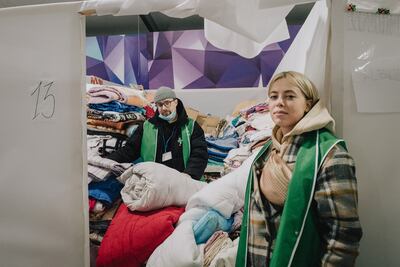
After a few days of sitting and worrying at home in the kitchen, which had become the couple’s makeshift sleeping quarters, they decided to lend a hand to the aid effort. On a recent afternoon, they were sorting and neatly folding donated bedding at the centre’s aid reception point.
The couple said they were touched by how Moldovans gave in abundance, despite the scarcity many feel at home. Many brought hand-knit woollens or well-loved quilts. Home-made bottles of pickles and preserves with handwritten labels line the shelves — all moving gestures of hospitality.
“It’s so rare that Ukrainians come to Moldova,” Polina said. “But I think this is a moment of cultural exchange, a chance for them to see that despite being poor, we have incredibly generous and welcoming people here.”



